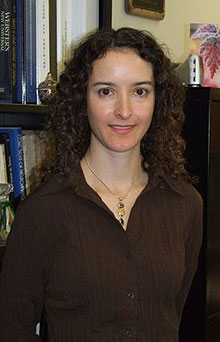  |
| HOME | THIS ISSUE | CALENDAR | GRANTS | BACK ISSUES | < BACK | NEXT > |
Researchers studying effect of incentives on treatment for smokingby Carolyn Pennington - September 22, 2008
|
||||
| A research team at the Health Center is examining whether adding incentives to a treatment program will help people give up smoking. Sheila Alessi, an assistant professor in the Department of Psychiatry, and her collaborators are studying whether an incentive-based behavioral intervention known as contingency management can improve outcomes among patients using varenicline, an approved medication for smoking cessation. Contingency management is a type of treatment in which patients receive incentives or prizes for “good” behavior – in this case, not smoking. “If a behavioral therapy such as contingency management can improve early response to varenicline,” says Alessi, “more patients may achieve abstinence, which should be associated with long-term abstinence and health benefits.” Tobacco use is the single most avoidable cause of death in the U.S. According to data from the state Department of Public Health, smoking kills more than 5,000 in Connecticut every year, yet more than 25 percent of the state’s population smoke. Nearly 70 percent of smokers want to quit, but each year fewer than 3 percent of them are successful. Participants in the study will be divided into two groups. One group will receive brief smoking cessation counseling with varenicline. The second group will receive the same brief counseling and varenicline, plus the chance to win prizes if their breath and urine samples test negative for cigarette smoking. The number of draws from a prize bowl increases as long as the participant continues to test negative over the 24-week study. The prize bowl contains about 500 cards, half of which are winning cards, according to Alessi. The prizes range from small toiletries, snacks, or coffee shop gift certificates, to tool kits, compact disc players, and prepaid telephone cards. One card in the prize bowl offers a $100 prize such as a DVD player, a television, or a stereo. The cards are replaced after each drawing so the probabilities remain constant. Contingency management treatment has been around since the late 1980s, and over the years opinion about the technique has shifted. Alessi’s co-investigator in the study, behavioral psychologist Nancy Petry, has been studying the technique for more than a decade.
“At first, therapists were horrified at the thought of rewarding substance abusers for abstaining,” says Petry. But as therapists use the technique and see it work in practice, support has grown dramatically, she says. A recent nationally-based survey of more than 900 treatment programs found that nearly a quarter have begun implementing contingency management. Another component of the smoking cessation study is measuring blood pressure before, during, and after the study. The participants will wear a small portable device that takes regular blood pressure and heart rate readings over 24-hour periods. “We expect that CM-treated patients will achieve greater decreases in blood pressure, and that reductions in blood pressure will correlate with smoking abstinence,” says Alessi. She also notes that the benefits of the research should extend to patients’ families, friends, and co-workers, who are vulnerable to the health risks associated with second-hand smoke. The economic cost of smoking to the nation is high: nearly $3,400 per smoker per year. In Connecticut alone, this amounts to more than $1.7 billion annually, according to data from the state Department of Public Health. Every pack of cigarettes sold in the U.S. costs an estimated $7.18 in medical care and lost productivity. Alessi’s research is being funded through a grant from the Patrick and Catherine Weldon Donaghue Medical Research Foundation. The grant is part of the Foundation’s Clinical and Community Health Issues Program, which has a particular interest in funding more effective methods of preventing, diagnosing, and treating illnesses and conditions that have a major impact on health in Connecticut. To participate in the study, please call 860-299-5607. |
| ADVANCE HOME UCONN HOME |

